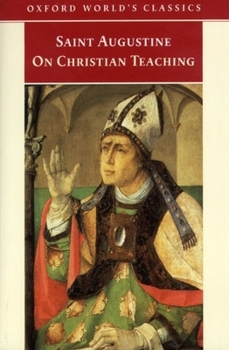Book Overview
The De Doctrina Christiana ("On Christian Teaching") is one of Augustine's most important works on the classical tradition. Undertaken at the same time as the Confessions, it sheds light on the development of Augustine's thought, especially in the areas of ethics, hermeneutics, and sign-theory. This completely new translation gives a close but updated representation of Augustine's thought and expression, while a succinct introduction and select bibliography...
Format:Paperback
Language:English
ISBN:0192839284
ISBN13:9780192839282
Release Date:September 1999
Publisher:Oxford University Press, USA
Length:208 Pages
Weight:0.05 lbs.
Dimensions:0.5" x 7.6" x 5.1"
Customer Reviews
3 ratings
Classic Augustine
Published by Thriftbooks.com User , 15 years ago
This is Augustine's classic text on the interpretation of scripture. Love is the answer, according to Augustine.
The Foundation of Modern Hermeneutics
Published by Thriftbooks.com User , 16 years ago
Of all the patristic works on the interpretation of Scripture, the De Doctrina Christiana ranks as the preeminent work of criticism. Both practical and theoretical, the work is much to be enjoyed for the succinctness of phrase and the pellucid and perspicacious development of its central argument. Certainly, the work is fundamentally pragmatic in nature: It is advice--originally for the priests of the diocese of Hippo--on correct biblical interpretation. However, it is much more than that. St. Augustine in many ways forms the groundwork for modern hermeneutics and semiotics in this text. In his discussion of charitable and concupiscent interpretations, he illustrates the nature and basis of a Christian interpretational praxis. In referring to the need for interpretation to be undertaken within, and submitted to, the community of the Church, he anticipates Stanley Fish's theory of interpretive communities. But even more than this, the De Doctrina is a guide for living the Christian life. St. Augustine notes that symbols point us toward that which is to be enjoyed, God the Three-in-One. In this way, St. Augustine illustrates the absolute immanence of God within all Creation, a latency which, with the proper hermeneutical framework of charity and faith, will burst forth with the utter effulgence of God Incarnate. This is a magisterial work, of interest both to Christians and non-Christians alike. This work will be especially helpful to those considering the problems of semiotics and hermeneutics or those who want better to access the densely multivalent world of medieval allegory. And I cannot recommend more highly D.W. Robertson's translation. It is engaging without being ponderous. The introductory essay is also well done.
Augustine's Hermeneutics
Published by Thriftbooks.com User , 18 years ago
One author has said that Augustine can be "easier to read than many modern books about him." Nowhere in his writings have I found this to be more true than "On Christian Doctrine." This little text was so compelling that I literally could not put it down (though that may reveal more about me than it). It essentially outlines Augustine's program of Hermeneutics which often contrasts strongly with standard methods of the periods before and after him, while remaining reminiscent of both eras. Some particular points of interest: -He insists that the author's intent should be the arbiter of meaning unless the text seems to be in contrast to what is clearly taught throughout scripture, at which point allegory is to be employed -He suggests that mistaken interpretation of a particular passage is not too grievous an error as long as the interpretation remains true to the general testimony of Scripture -He suggests that interpretation is difficult but that the best way to progress is to read and memorize as much of it as possible until it is intimately familiar -There is a theologically interesting chapter in which he uses the passage about the bread as Christ's body as an example of the sort of passage that cannot be taken literally A 1700 year old text obviously isn't going to work as a contemporary manual of interpretation, but for its value in historical theology, understanding the development of Biblical interpretation and insight into the mind of one of the Christianity's greatest pastoral minds this is well worth the money and 100 or so pages.






